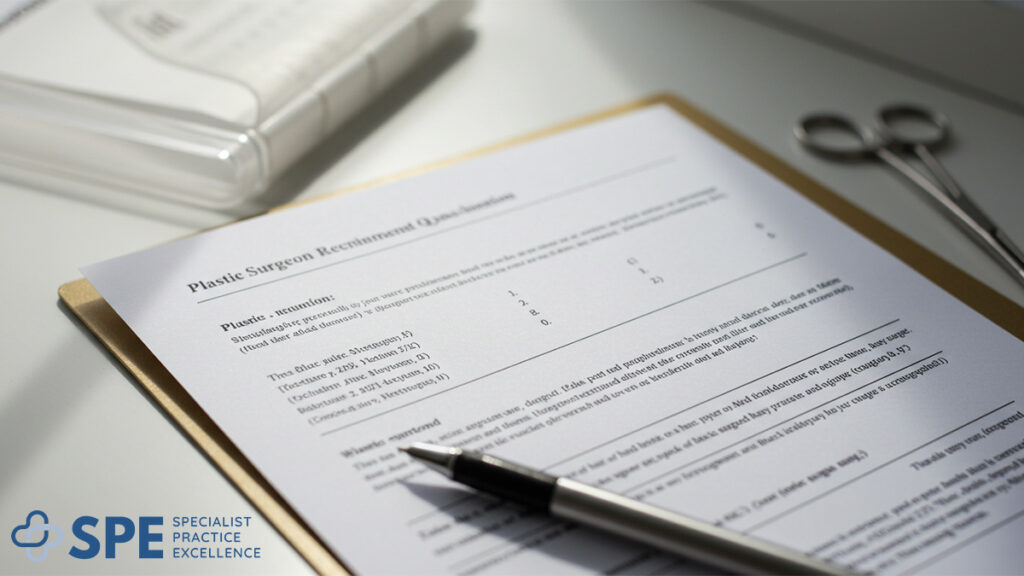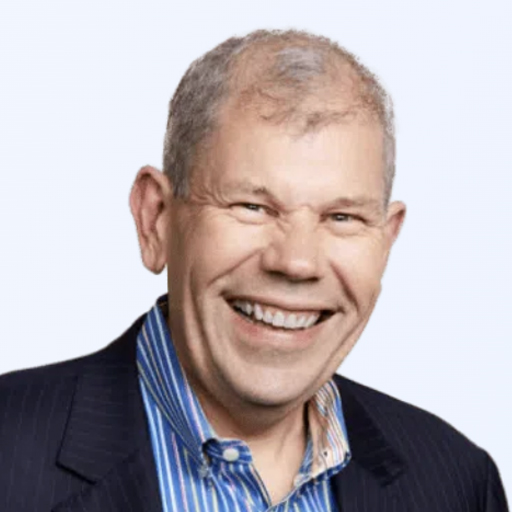Table of Contents
- Best Recruitment Questions for a Plastic Surgeon for Your Practice
- Other Useful Plastic Surgeon Recruiting Questions
- Motivation and Career Goal Questions
- Clinical Skills and Patient Care Questions
- Practice Fit and Professionalism Questions
- Teaching, Mentorship, and Learning Questions
- Business and Growth Orientation Questions
- Lifestyle, Commitment, and Flexibility Questions
- Questions for Probing “Dig Deeper” Questions
-
- Candidate Motivation & Career Goal FAQs
- Patient Care, Empathy & Confidentiality FAQs
- Handling Pressure, Stress & Resilience FAQs
- Organisation, Detail & Problem-Solving FAQs
- Teamwork, Culture & Fit FAQs
- Red Flags & Difficult Behaviours FAQs
- Testing Communication & Honesty FAQs
- Practical & Logistical Fit FAQs
- Reference Checks & Verification FAQs
- Taking Action on Recruiting the Best Plastic Surgeon
- Further Reading on Plastic Surgeon Recruitment Questions & Recruiting Tips
Best Recruitment Questions for a Plastic Surgeon for Your Practice
Recruiting a plastic surgeon into a private practice is one of the most significant decisions a clinic can make. Unlike hiring support staff, bringing in a fellow or senior surgeon is not just about skills — it’s about alignment, vision, and long-term impact. The right surgeon can elevate your practice’s reputation, strengthen patient trust, and open new avenues for growth. The wrong hire, however, can create years of friction, lost revenue, and reputational damage.
In today’s competitive aesthetic corporate market, practices need more than gut feel and technical checklists — they need smart, probing interview questions that uncover motivation, surgical philosophy, communication style, and cultural fit. Whether you’re hiring a fellow eager to learn or a senior surgeon ready to contribute, the recruitment process should go deeper than a CV or references. It’s about finding a partner in patient care and, potentially, a future leader of your practice.
This guide outlines some of the best plastic surgeon recruitment questions to ask when hiring plastic surgeons — questions designed to reveal not just technical competence, but also values, resilience, and long-term potential.
Best Recruiting Interview Questions for a Plastic Surgery Fellow
Motivation & Career Development
- Why did you choose plastic surgery as your specialty?
- What are your subspecialty interests (breast, body, face, hand, reconstructive)?
- What are you hoping to learn or refine during your fellowship year?
- Where do you see yourself in five years — private practice, academia, or hospital-based?
- What drew you to apply for this fellowship program and this specific practice?
Clinical Competence & Learning
- Which procedures are you most confident performing independently?
- Which procedures do you want more exposure to during fellowship?
- Can you describe a recent challenging case you assisted with and what you learned?
- How do you balance speed with precision when operating under supervision?
- How do you handle constructive criticism in theatre or clinic?
Patient Care & Communication
- How do you explain risks and complications to patients in a way they understand?
- Tell me about a time you dealt with a very anxious or difficult patient.
- What strategies do you use to build trust quickly with patients you’ve just met?
- How do you handle a patient who has unrealistic expectations about surgery?
- How would you support a patient through complications or an extended recovery?
Teamwork & Professionalism
- How do you see your role fitting in with nurses, coordinators, and admin staff?
- How do you respond when you disagree with your supervising surgeon’s approach?
- Tell me about a time you supported a colleague under pressure.
- What’s your approach to building relationships with anaesthetists and theatre teams?
- How do you balance humility as a trainee with confidence as a surgeon-in-training?
Growth & Academic Contribution
- Are you interested in research, publications, or teaching during your fellowship?
- How do you keep up to date with innovations and surgical techniques?
- What courses, conferences, or workshops have you attended recently?
- How do you see mentorship shaping your career?
- What skills beyond surgery (business, leadership, communication) are you looking to develop here?
Best Recruiting Interview Questions for a Senior Plastic Surgeon
Motivation & Practice Fit
- What interests you most about joining this practice at this stage of your career?
- What differentiates your surgical approach or philosophy from other surgeons?
- Which procedures do you most want to focus on in private practice?
- How do you see yourself contributing to the growth and reputation of the clinic?
- What does an ideal practice partnership or collaboration look like to you?
Clinical Experience & Reputation
- What surgical procedures make up most of your caseload currently?
- Can you share a complex or high-stakes case you’ve managed and the outcome?
- How do you approach complications and revisions in your own cases?
- How do you balance functional outcomes with aesthetics in surgery?
- How do you measure patient satisfaction and success in your work?
Patient & Practice Management
- How do you handle consultations with patients who are unsure or conflicted?
- What’s your approach to managing demanding or dissatisfied patients?
- How do you feel about participating in patient education events or seminars?
- What’s your philosophy on patient selection and saying “no” to cases?
- How do you manage medico-legal risks and documentation in private practice?
Leadership & Team Contribution
- What role do you see yourself playing in mentoring junior surgeons or fellows?
- How do you collaborate with non-surgical team members (nurses, dermal staff, coordinators)?
- Tell me about a time you resolved conflict within a multidisciplinary team.
- How do you balance autonomy with working within a structured clinic system?
- What’s your approach to training or developing others in surgical techniques?
Business & Growth Orientation
- How do you view the balance between clinical excellence and commercial success?
- How comfortable are you with marketing, social media, or brand promotion?
- What has been your role in business development in your previous practice?
- What’s your expectation around patient load, operating days, and income contribution?
- Where do you see yourself and this practice in 5–10 years?
Other Useful Plastic Surgeon Recruiting Questions
Motivation and Career Goal Questions
- What drew you to specialise in plastic surgery?
- Why are you interested in working in this practice rather than a hospital or another clinic?
- Where do you see yourself in five years — private practice owner, academic, or team member?
- What are your subspecialty interests (e.g. breast, body, face, hand, reconstructive)?
- What professional achievements are you most proud of so far?
Clinical Skills and Patient Care Questions
- Which procedures do you consider your strongest skill set?
- Are there surgeries you prefer not to perform? Why?
- Tell me about a particularly challenging surgical case and how you handled it.
- How do you manage patient expectations before surgery?
- What’s your approach when a patient is dissatisfied with results?
- How do you balance aesthetic goals with functional outcomes in surgery?
- How do you approach complications, and how do you communicate them to patients?
Practice Fit and Professionalism Questions
- How do you see your role fitting within a private practice environment?
- What’s your experience working with patient coordinators, nurses, and practice managers?
- How do you feel about the commercial aspects of practice — consultations, patient conversion, follow-up?
- How would you describe your communication style with patients and colleagues?
- What values are non-negotiable for you in a workplace culture?
- How do you maintain professionalism under pressure or with difficult patients?
Teaching, Mentorship, and Learning Questions
- What role has mentorship played in your career so far?
- Are you comfortable teaching junior staff, nurses, or medical students?
- What surgical or clinical skills are you still keen to develop?
- How do you keep up to date with surgical innovations and techniques?
- Which conferences, journals, or networks do you follow most closely?
Business and Growth Orientation Questions
- How do you see yourself contributing to practice growth and reputation?
- What’s your comfort level with public speaking, media, or community engagement?
- How do you feel about participating in social media and marketing activities?
- Do you have experience with medico-legal risk, and how do you protect yourself and the practice?
- How do you feel about working to productivity targets or patient volume goals?
Lifestyle, Commitment, and Flexibility Questions
- What is your ideal workload — how many operating days, consulting days, or injectables per week?
- How do you balance work-life commitments with the demands of surgery?
- Are you willing to work across multiple sites (clinic, hospital, day surgery)?
- How flexible are you with after-hours patient calls or emergency situations?
- How long do you see yourself staying in this practice if it’s the right fit?
Questions for Probing “Dig Deeper” Questions
- Can you walk me through your most recent consultation and how you handled patient concerns?
- If you had your time again, how would you manage that case differently?
- What’s the biggest professional challenge you’ve faced in the past two years?
- What feedback have you received from colleagues or mentors that has shaped your practice?
- How do you see yourself differentiating from other surgeons in this city?
Plastic Surgeon Recruitment FAQs
Recruitment in a plastic surgery practice is high-stakes. Below is a comprehensive FAQs designed to help surgeons and practice managers make smarter hiring decisions.
Candidate Motivation & Career Goal FAQs
Q: How do I uncover a candidate’s real motivations for wanting to work in a plastic surgery practice?
Ask “What are you hoping to get here that you didn’t have in your last role?” or “Why choose aesthetics and surgery over general practice or hospitals?” Their answers will reveal if they’re motivated more by patient care and professional growth — or by aesthetics, perks and rewards.
Q: What are smart questions to uncover long-term commitment?
Try “Where do you see yourself in three years?” and “What would make you stay with us long term?” Follow up with “What would make you leave?”
Q: How do I probe if someone really wants this job and not just any job?
Ask “What is it about our practice that made you apply?” and “What’s the one thing about working here that excites you most?” Generic answers are a warning sign.
Q: Can I test how competitive or ambitious someone is?
Yes — ask “What’s been your proudest professional win so far?” and “How do you measure your own success?”
Patient Care, Empathy & Confidentiality FAQs
Q: What’s a good way to test if someone can handle emotional patients?
Ask “Can you walk me through how you handled an upset patient step by step?” Then probe with “What did you say?” and “What happened next?”
Q: How can I tell if someone has a true patient-care mindset?
Ask “Tell me about a time you went above and beyond for a patient.” Look for enthusiasm and detail in their answer.
Q: How do I spot candidates who might struggle with confidentiality?
Ask “What’s your approach when friends or family ask you about your work?” Candidates who instinctively separate personal and professional boundaries are safer hires.
Q: How do I check if they respect boundaries with patients?
Ask “What would you do if a patient tried to add you on social media or asked for your personal number?”
Q: How can I test their ability to upsell or educate patients ethically?
Ask “Tell me about a time you recommended something additional to a patient. How did you explain the value?”
Handling Pressure, Stress & Resilience FAQs
Q: How do I test if someone is resilient enough for a high-volume practice?
Ask “Tell me about the busiest day you’ve ever had. How did you stay on top of things?”
Q: How do I identify someone who won’t cope with a fast-paced environment?
Ask “Describe the busiest week you’ve ever had in a clinic or workplace. How did you manage it?”
Q: What should I ask to identify potential burnout risks?
Ask “What type of work drains you most?” and “How do you recover after a tough week?”
Q: How do I assess if they’ll stay calm during surgical complications or emergencies?
Ask “Have you ever been involved in a situation where things went wrong medically? How did you respond?”
Q: Should I ask about how they manage stress outside of work?
Yes — ask “How do you unwind after a stressful week?” Healthy answers usually involve hobbies, exercise, or family.
Organisation, Detail & Problem-Solving FAQs
Q: How can I check if someone is really organised and detail-oriented?
Ask “Tell me about a time you made a mistake in scheduling, documentation, or patient care. How did you fix it?”
Q: How do I test problem-solving ability during interviews?
Pose a scenario: “A patient arrives upset because their surgery was delayed by two hours. How would you handle it?”
Q: How do I know if they’ll follow systems rather than make up their own?
Ask “Tell me about a time you had to follow strict procedures. Did you ever feel tempted to shortcut them?”
Q: How do I test how quickly someone learns?
Ask “Tell me about the last new system, device, or treatment you had to learn. How long did it take you to feel confident?”
Q: Can I test initiative?
Yes — ask “Tell me about a time you saw a problem at work that wasn’t technically your job to fix. What did you do?”
Teamwork, Culture & Fit FAQs
Q: How do I test cultural alignment with the surgeon’s philosophy?
Ask “What do you think makes a great plastic surgery practice?” and “What values would you want your workplace to stand for?”
Q: How can I test cultural fit in an interview?
Ask “What are three things that make a workplace great for you, and three that make you leave?”
Q: How do I test how well they work in teams?
Ask “Tell me about the best team you’ve been part of. What made it work?” Then contrast with “What made the worst team you worked in so difficult?”
Q: How do I uncover if a candidate will clash with my existing team?
Ask “What type of people do you find hardest to work with?”
Q: What’s a creative way to check cultural fit?
Ask “If you could design the perfect team day for us, what would it look like?”
Red Flags & Difficult Behaviours FAQs
Q: How do I spot if someone hates accountability or structured systems?
Ask “Why did you leave your last role?” If they complain about micromanagement or KPIs, it’s a red flag.
Q: What’s the best way to uncover if someone is secretly difficult to manage?
Ask “What did you find most frustrating about your last manager?” and “How did you handle it?”
Q: How do I identify candidates who dislike patient-facing roles?
Ask “How do you feel about spending most of your day face-to-face with patients?”
Q: What’s a way to identify candidates who are overly political or gossipy?
Ask “How do you usually deal with workplace drama or gossip?”
Q: How do I uncover if they’re burnt out from previous roles?
Ask “What kind of work are you hoping to do less of in this role?”
Testing Communication & Honesty FAQs
Q: What’s a clever way to test written communication before I hire?
Send a “sneaky email test” with 2–3 questions. Check how fast they respond, how complete their answers are, and how professional their tone is.
Q: How do I test honesty in interviews?
Ask “What’s one weakness that you’re actively working on improving?” Look for authentic, reflective answers.
Q: Should I ask unusual or unexpected questions?
Yes — they reveal personality. Examples:
- “What would your best friend say is your most annoying habit?”
- “If you had to choose between speed or accuracy at work, which would you pick and why?”
- “If you could change one thing about the way medical practices operate, what would it be?”
Q: How do I avoid being fooled by rehearsed answers?
Always ask follow-ups: “What exact words did you use?” “What happened after that?” “How did the patient react?” Rehearsed answers fall apart under deeper probing.
Practical & Logistical Fit FAQs
Q: Should I ask about gaps in employment history?
Always — ask “I noticed a gap here. What were you doing during that time?” Clear answers show transparency.
Q: How do I test reliability?
Ask “When was the last time you were late to work or missed a shift? What happened?”
Q: How do I find out if they’ll be flexible with last-minute changes?
Pose a scenario: “You’re about to finish for the day when the surgeon asks you to stay late. What would you do?”
Q: Should I ask about pay expectations and financial literacy?
Yes — ask “What salary range are you expecting?” and “What’s your approach to handling patient payment discussions?”
Q: How do I check if someone has realistic expectations of the job?
Ask “What do you think will be the hardest part of this job for you?” and “What surprises do you expect in the first three months?”
Reference Checks & Verification FAQs
Q: Can I uncover hidden red flags during reference checks?
Yes — ask their referees “Would you rehire this person?” and “Would you trust them in a high-pressure front-line role again?”
Q: Should I check social media and LinkedIn?
Yes — their LinkedIn is often the most honest CV. Social media checks reveal professionalism and lifestyle fit.
Q: Can I use trial tasks as part of the interview?
Yes — role-play a patient enquiry, ask them to draft an email, use your EHR or walk through scheduling. It shows their skills in action.
Taking Action on Recruiting the Best Plastic Surgeon
Recruiting a plastic surgeon is both an opportunity and a responsibility. The process is not just about filling a role; it’s about protecting your practice’s culture, ensuring continuity of patient care, and positioning your clinic for future success. Every question you ask in an interview should help you look beyond surgical skill — to motivation, mindset, and alignment with your practice’s values. Marital divorce is painful and costly – A Medical Divorce is even more painful and more costly. Choose wisely!
Fellows bring energy, curiosity, and adaptability. Senior surgeons bring experience, leadership, and the potential to shape the direction of your clinic. Both groups require careful evaluation, honest conversations, and thoughtful decision-making.
By using structured, well-designed recruitment questions — and by listening closely to how candidates reveal their behaviour, values & character, not just their competence — you’ll reduce costly hiring mistakes and find surgeons who not only operate well but also fit seamlessly into your practice’s vision.
In the long run, the right recruitment choice strengthens your team, safeguards your reputation, and ensures the next chapter of your practice is built on strong foundations.











